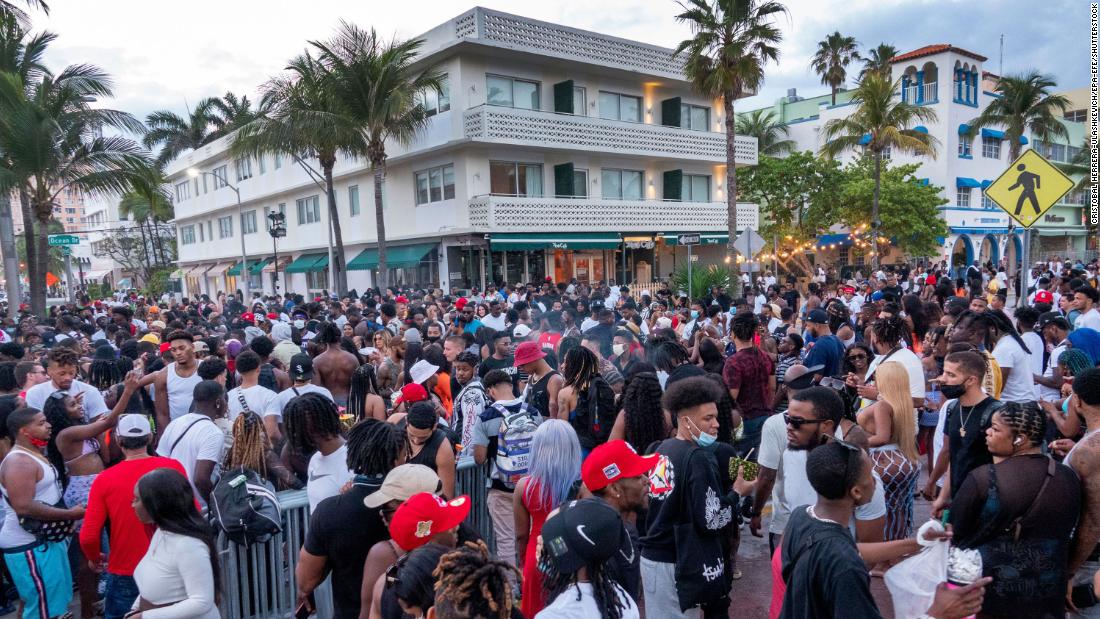
“I don’t see anyone taking precautions,” Pena, 32, told CNN. “Nobody wears masks, nobody has social distance.”
Images from South Florida spring break give little indication that a deadly virus is still rife in the country. According to data from Johns Hopkins University, an average of about 54,600 new cases and more than 1,000 virus-related deaths per day were reported in the US in the past week.
“You see those pictures of people crowded into bars, for example, especially indoors, no masks, no physical distance actually,” said Cindy Prins, an epidemiologist at the University of Florida. “That just creates an unfortunately ideal situation for the transfer of Covid.”
And the crowds are showing little sign of thinning, with the Miami Beach police chief saying the number of visitors has multiplied in recent weeks – and the trend is likely to continue into April.
Pena isn’t just worried about contracting the virus herself. Like local officials and experts, she says she is concerned that the throngs could lead to further spikes and devastation in her community and the country – which she experienced firsthand when she lost her grandmother to the virus in October.
“I fear even more deaths, just as I experienced and was part of Covid’s victims,” she said. “We are losing people left and right through carelessness and negligence.”
Residents of South Florida that CNN spoke to expressed the same concern, adding that they understand the tough decisions made by government leaders as they try to balance the desire for a healthy economy with the security of a community. But, several residents said, they wish the state would welcome visitors in a safer way, with stricter enforcement of rule breakers.

People enjoy themselves along Ocean Drive on March 19, 2021 in Miami Beach, Florida
Joe Raedle / Getty Images
‘It doesn’t look good’
Emily Arcia, who lives in Miami, said for months that she only left the house when absolutely necessary, taking outdoor walks alone with her husband on the beach – and only after preparing with masks and gloves.
While fully vaccinated, her husband just got his first shot, and going outside – especially now – makes the couple nervous again.
“I live right in front of the ocean, I live right next to a park and it’s packed,” said Arcia, 66 ,. “I don’t even go down on Saturdays and Sundays because there are just too many people.”
During the time when Covid-19 cases were booming in the community, she heard first responders’ sirens from her balcony – at a much more frequent rate than usual. It’s a marker she fears will reappear.
“I have no idea what can be done to prevent what I think will be a spike in cases,” she said. “I hope the number of vaccines being provided will somehow balance that out. But, you know, it doesn’t look good. ‘
And it’s not just the state that could see consequences.
“It’s not all about what will happen in Florida,” says emergency room Dr. Leana Wen. “It’s about what will happen when people return to where they came from and then become asymptomatic carriers who can pass the virus on to other vulnerable people.”
The recurring spring breakers, she says, could provide power surges across the country.

A large crowd of people join a party on a walkway near the beach during Spring Break in Miami Beach on March 20, 2021
Cristobal Herrera-Ulashkevich / EPA-EFE / Shutterstock
Local leaders fear lost progress

A general view of people partying at the Elbo Room on Fort Lauderdale Beach on March 14, 2021
Larry Marano / Shutterstock
“We put in a lot of time and energy and brought down all of our key indicators,” Miami Mayor Francis Suarez told CNN on Thursday. “It’s clear that spring break brings a flood of tourists and they may not think as conscientiously as the people who stay here and face the consequences later on.”
Gelber, in Miami Beach, is also scared. “There are too many people coming who just want to let go in a way that is unacceptable, and we have a pandemic, including, I think, really central ground for the variant,” he said recently.
And experts, including Wen, have warned that as high levels of infection persist as the country works to vaccinate more Americans, it is more likely that the virus will continue to mutate and more worrying variants could emerge, which could not be more transmissible on their own – but also pose a problem for vaccines.
“So the more the community spreads, the more these variants could develop and that could really bring us back,” Wen said.
CNN’s Travis Caldwell contributed to this report.